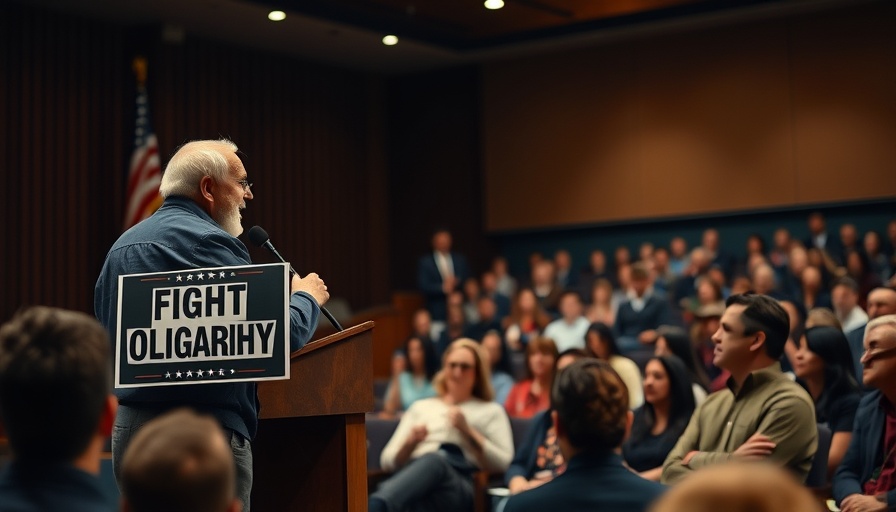
Economic Populism’s Key Role in Reviving the Rio Grande Valley
As America grapples with persistent economic challenges and a growing polarization of political sentiments, a movement is becoming increasingly vital in regions like the Rio Grande Valley. Spearheaded by U.S. Senator Bernie Sanders and Congressman Greg Casar, the appeal of economic populism is once again taking center stage. During a recent event in McAllen, where rain clouds gathered ominously, the focus shifted from everyday troubles to grand ideals—the belief that change is achievable, even in historically overlooked areas.
The Rise of Economic Populism
The core message from Sanders and Casar resonates strongly among the Valley's predominantly Latino population, which has been affected by a range of social and economic challenges. In this context, populism is not merely a political tactic; it’s a rallying cry against the oligarchs who threaten the livelihoods of working-class families. Instead of pushing for partisan agendas, both leaders advocate for a grassroots movement that prioritizes the interests of the working class.
Beyond Local, Into the National Scene
The Valley's unique socioeconomic landscape places it at a crossroads. For generations, it has remained a steadfast Democratic stronghold, yet recent elections have shown a shift towards Republican ideals. Once buoyed by figures like Hillary Clinton, who won Hidalgo County by a landslide in 2016, the shift has alarmed local Democrats. In 2024, Donald Trump managed to flip all four counties in the region—a stark reminder that the political establishment must adapt or risk losing its base.
Jon Taylor, chair of the political science department at the University of Texas at San Antonio, suggests that despite setbacks, opportunities remain for the Democratic Party. Leaning into populism could allow them to channel widespread frustration with the current political order, appealing to voters who feel left behind by bureaucratic elites.
A Community That Isn’t Taking It Anymore
Populism is about more than economically driven policies; it’s anchored deeply in the emotions and fears of the community. Many families in the Valley are directly affected by the harsh realities of ICE raids and authoritarian governance. The specter of Trump’s policies looms large and leaves people questioning their safety and sovereignty. Sanders emphasized this by sharing chilling stories of community members being snatched from their workplaces without due process, highlighting a local experience that resonates starkly with broader national trends.
“What Trump is doing is not just waging an attack against the working class. He is moving America very rapidly into an authoritarian form of society,” Sanders noted. The urgency in his words reflects a broader fear felt by many voting residents; they are aware that their rights are at stake.
Paving the Way for Change
The recent changes in political allegiance within the Rio Grande Valley present both challenges and opportunities for progressive leaders. There is a palpable energy in the air—people are tired of complacency among their representatives. The running theme in both Sanders’ and Casar’s speeches was the need for unity among the working class, a call that resonates amidst growing concerns about inequality fueled by extremist policies.
With a concerted focus on bringing disenfranchised voice back into the fold, the idea that the Valley can redirect its political future through economic populism is not just possible; it’s necessary. As local sentiment evolves, it will also be vital to unite disparate identity groups under a singular vision for economic justice.
Lessons in Democratic Resilience
How does the fate of the Rio Grande Valley reflect the broader American political scene? One word emerges: resilience. The groundwork is being laid to harness the anger felt by voters against the status quo. At this nexus of cultural and socioeconomic identity, the Valley could serve as a model for how regions across the country unify around economic populism. The choice is now on the shoulders of voters: embrace the new narrative or continue to watch as political power shifts beneath their feet.
As a pivotal moment in American politics unfolds, how local communities respond will have implications far beyond their borders. The push for economic populism could usher in a new era of inclusion and accountability if grassroots movements can coalesce and challenge entrenched interests.
Conclusion: Can Economic Populism Thrive?
The stage is set for a resurgence of economic populism in the Rio Grande Valley, driven by leaders who echo a hopeful vision of change. In a country where political battles often leave communities fragmented, the promise of unified action may serve as a beacon of hope for many. As the community assesses its path forward, the words of Sanders and Casar will linger, signaling that the Valley can indeed reclaim its political agency and inspire wider change in a nation hungry for better representation. If the Valley can channel its collective voice, it may not just reshape its own future but that of the entire nation.
 Add Row
Add Row  Add
Add 




Write A Comment